Dynham Surname Ancestry ResultsOur indexes 1000-1999 include entries for the spelling 'dynham'. In the period you have requested, we have the following 44 records (displaying 21 to 30): Single Surname Subscription | | | Buying all 44 results of this search individually would cost £198.00. But you can have free access to all 44 records for a year, to view, to save and print, for £100. Save £98.00. More... |
These sample scans are from the original record. You will get scans of the full pages or articles where the surname you searched for has been found. Your web browser may prevent the sample windows from opening; in this case please change your browser settings to allow pop-up windows from this site. Somerset Feet of Fines
(1400-1484)
Pedes Finium - law suits, or pretended suits, putting on record the ownership of land in Somerset. These abstracts were prepared by Emanuel Green for the Somerset Record Society and published in 1906. They cover material for the county from the reigns of Henry IV, Henry V, Henry VI, Edward IV and Richard III.DYNHAM. Cost: £4.00.  | Sample scan, click to enlarge
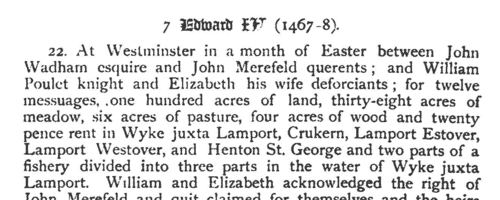
| Clergy, the religious and the faithful in Britain and Ireland
(1471-1484)
These are abstracts of the entries relating to Great Britain and Ireland from the Lateran and Vatican Regesta of pope Sixtus IV. Many of these entries relate to clerical appointments and disputes, but there are also indults to devout laymen and women for portable altars, remission of sins, &c. This source is particularly valuable for Ireland, for which many of the key government records of this period are lost. Many of the names in the text were clearly a puzzle to the scribes in Rome, and spelling of British and Irish placenames and surnames is chaotic. Sixtus IV was consecrated and crowned 25 August 1471 (the day from which his pontificate is dated) and died at Rome 12 August 1484. The extracts were made by J. A. Twemlow from Vatican Regesta dxlvi to dclxxxi and Lateran Regesta dccxiii to dcccxxxviii, and published in 1955. Not all the Lateran registers survive from this pontificate, but were still in existence in the 18th century, when indexes were compiled giving rubricelle, or brief summaries of the papal bulls; nor, indeed, have all these indexes now survived, but Twemlow added an appendix listing all the rubricelle relating to the British Isles extant for the reign of Sixtus IV.DYNHAM. Cost: £4.00.  | Sample scan, click to enlarge

| London and Middlesex Feet of Fines
(1198-1485)
Pedes Finium - law suits, or pretended suits, putting on record the ownership of land in London and Middlesex.DYNHAM. Cost: £4.00.  | Sample scan, click to enlarge

| Landowners and tenants in Suffolk
(1345-1485)
Inquisitions ad quod damnum were held by the appropriate sheriff or escheator (or other officer in whose bailiwick the matter in question might lie) to investigate cases in which the royal or public interest might be damaged by proposed alienation or settlement of land (especially alienation to religious uses, into mortmain). The key findings from these inquisitions were as to the tenure of the land and the service due from it; its yearly value; the lands remaining to the grantor, and whether they sufficed to discharge all duties and customs due from him; and whether he can still be put upon juries, assizes and recognitions, so that the country be not burdened by his withdrawal from them. Generally speaking, this process had the makings of a system of licensing such alienations, and raising money in proportion to the valuations. Equally, there are many items that deal with subjects such as the closing of public roads, the felling or inclosing of woods, or the proposed grant of liberties or immunities. A calendar of these inquisitions from the 19th year of the reign of king Edward III to the 2nd year of Richard III was prepared by the Public Record Office and published in 1906. We have now indexed this calendar by surname and county. Most of the individuals appearing in the calendar are either pious individuals seeking to make grants to religious bodies for the sake of their souls; or landowners securing the disposition and settling of their real estate. But some other names do appear - tenants, trustees, chaplains and clerks.DYNHAM. Cost: £6.00.  | Sample scan, click to enlarge
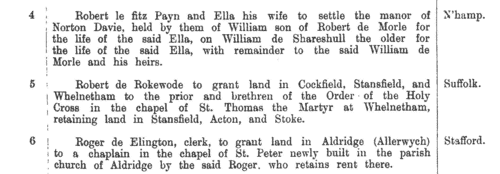
| Landowners and tenants in Wiltshire
(1345-1485)
Inquisitions ad quod damnum were held by the appropriate sheriff or escheator (or other officer in whose bailiwick the matter in question might lie) to investigate cases in which the royal or public interest might be damaged by proposed alienation or settlement of land (especially alienation to religious uses, into mortmain). The key findings from these inquisitions were as to the tenure of the land and the service due from it; its yearly value; the lands remaining to the grantor, and whether they sufficed to discharge all duties and customs due from him; and whether he can still be put upon juries, assizes and recognitions, so that the country be not burdened by his withdrawal from them. Generally speaking, this process had the makings of a system of licensing such alienations, and raising money in proportion to the valuations. Equally, there are many items that deal with subjects such as the closing of public roads, the felling or inclosing of woods, or the proposed grant of liberties or immunities. A calendar of these inquisitions from the 19th year of the reign of king Edward III to the 2nd year of Richard III was prepared by the Public Record Office and published in 1906. We have now indexed this calendar by surname and county. Most of the individuals appearing in the calendar are either pious individuals seeking to make grants to religious bodies for the sake of their souls; or landowners securing the disposition and settling of their real estate. But some other names do appear - tenants, trustees, chaplains and clerks.DYNHAM. Cost: £6.00.  | Sample scan, click to enlarge
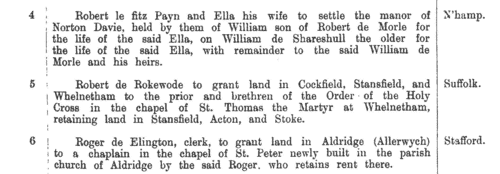
| Early records of Wells cathedral, in Somerset
(1001-1500)
Three early registers of the dean and chapter of Wells - the Liber Albus I (White Book; R I), Liber Albus II (R III), and Liber Ruber (Red Book; R II, section i) - were edited by W. H. B. Bird for the Historical Manuscripts Commissioners and published in 1907. These three books comprise, with some repetition, a cartulary of possessions of the cathedral, with grants of land dating back as early as the 8th century, well before the development of hereditary surnames in England; acts of the dean and chapter; and surveys of their estates, mostly in Somerset.DYNHAM. Cost: £6.00.  | Sample scan, click to enlarge

| Devon Pedes Finium (1506)
Sales of land were registered by means of fictitious suits of covenant entered in the Common Pleas, the details of which were recorded in separate parchment indentures called Feet of Fines or Pedes Finium. This calendar gives an abstract of each deed: in most cases the seller is the deforciant, the purchaser is the plaintiff, and the land is described in the broadest terms, as so many messuages, tofts, gardens, acres of (arable) land, meadow, pasture, woodland, furze and heath, rents &c. The properties range from large manors to single houses or plots of land. The calendar is indexed by the surnames of sellers, purchasers and trustees.
DYNHAM. Cost: £8.00.  | Sample scan, click to enlarge
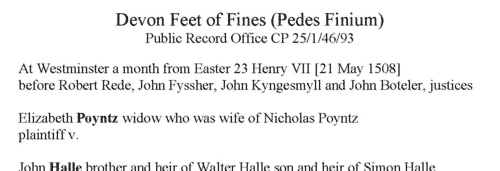
| Justices of the Peace in Buckinghamshire
(1509-1510)
Royal grants of all kinds were enrolled on the Patent Rolls of England. Many of these grants originated as signed bills (S. B.) or privy seals (P. S.). J. S. Brewer calendared the rolls for the first year of the reign of king Henry VIII (22 April 1509-21 April 1510) for the Master of the Rolls, including all the surviving signed bills and privy seals (some of which had never led to enrolment), in this volume published in 1862. Among the grants were commissions of the peace, appointing justices for each of the counties.DYNHAM. Cost: £6.00.  | Sample scan, click to enlarge
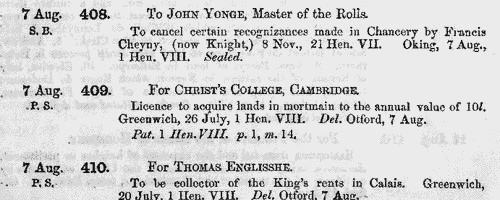
| Recipients of grants of land by the Crown; and other grantors and grantees
(1427-1516)
Grants of land by the Crown were enrolled on the Charter Rolls: but this series of records was also used by other magnates and religious houses as a way of having their own deeds inspected, confirmed and registered. It will be seen from this that some of the material described in these inspeximuses dates back to a considerably earlier period. In addition, there is an appendix of fragments of charter roll material from 1215 and 1286 to 1288. The royal grants enrolled relate not only to land, but also to various privileges that were part of the royal prerogative.
Most of the material is from England, the remainder relating to Ireland, Wales and possessions in France, but virtually nothing from Scotland, which was an independent kingdom at this period.DYNHAM. Cost: £4.00.  | Sample scan, click to enlarge
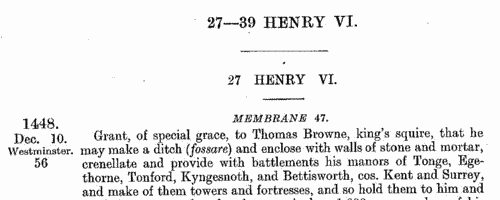
| Liegemen and Traitors, Pirates and Spies
(1547-1550)
The Privy Council of Edward VI was responsible for internal security in England and Wales, and dealt with all manner of special and urgent matters
DYNHAM. Cost: £4.00.  | Sample scan, click to enlarge

|
Research your ancestry, family history, genealogy and one-name study by direct access to original records and archives indexed by surname.
|












